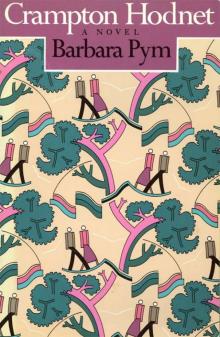- Home
- Barbara Pym
A Few Green Leaves Page 2
A Few Green Leaves Read online
Page 2
With her omelette Emma poured out a glass of red wine from a bottle already started, which had been warming by the side of the storage heater all the weekend. She was sure that Adam Prince would not have approved of that, but she felt relaxed and at peace as she ate and drank. It was a moment to turn on the television, to watch idly whatever happened to be going on.
It seemed to be a discussion – two men and a woman were confronting a politician from one of the new African republics, a Sandhurst-trained brigadier, his black face glowering. The argument became heated as the participants shifted uneasily on the too-low chairs and reached down to the even lower table to refresh themselves with some kind of liquid – perhaps only water –from heavy-based dark tumblers. The chairs appeared to be covered in a kind of furry material which Emma, not having a colour set, imagined to be like the pelt of a seal or an otter. She was fascinated by this and hypnotised by the complexities of the discussion which, having switched on in the middle, she was having difficulty in following. The chairman, a mild man who seemed to be in awe of the sharp-tongued woman participant, was doing his best to see that each of the men got a fair crack of the whip, as he might have put it. It was not until Emma heard him address one of them as ‘Dr Pettifer’ that she realised that this was Graham Pettifer, a man with whom she had once had a brief love affair. To say that he had been her ‘lover’ was altogether too grand a way to describe what their association had been; perhaps even ‘love affair’ was not strictly accurate, for there had not been all that much love about it, no more than proximity and a mild affection. But, anyway, it would have been true enough to say that she had once known Graham Pettifer ‘quite well’, though she had not seen him for many years. He had gone out to one of the African universities to teach something called ‘social studies’ and had now, presumably, come back, perhaps even to take up an appointment in this country?
He must be getting on for forty now, she calculated, and he had improved in looks, filled out or something. She drained her glass, meditating on this. Then, seeing that there was still some left in the bottle, finished it. The wine was decidedly warm, rather over-chambre, Adam Prince would have said, but it gave her comfort and boldness. Hardly realising what she was doing, or marking the distinction between fact and fiction, she put a sheet of paper into her typewriter and began to compose a letter.
‘Dear Graham,’ it said, ‘I’ve just seen you in a TV discussion! What a great bringer-together of people who haven’t met for ages the medium must be! I’m living here (temporarily) in my mother’s cottage, so if you’ – she paused, unable to remember his wife’s christian name – ‘are anywhere in this direction, do come and see me.’ The ‘you’ could very well cover a wife and any number of children, she thought, picturing a large estate car driving up one day, filled with Graham Pettifer and his family. She hadn’t said anything about enjoying the discussion, she realised, but surely it was enough to say that she had recognised him?
In bed later that night she remembered that of course his wife’s name had been Claudia – she would be able to bring that out when the occasion arose. If it ever did.
3
Monday was always a busy day at the surgery, a rather stark new building next to the village hall. ‘They’ – the patients – had not on the whole been to church the previous day, but they atoned for this by a devout attendance at the place where they expected not so much to worship, though this did come into it for a few, as to receive advice and consolation. You might talk to the rector, some would admit doubtfully, but he couldn’t give you a prescription. There was nothing in churchgoing to equal that triumphant moment when you came out of the surgery clutching the ritual scrap of paper.
Martin Shrubsole hurried through the waiting-room, head bent, as if he expected to receive a blow. He did not want to recognise any of the patients waiting there, preferring to be taken by surprise, but he noticed two he didn’t particularly want to see – the rector’s sister, and Miss Lickerish, an elderly village eccentric. Possibly they were waiting to see Dr Gellibrand, but Martin had not heard him arrive yet so it might be that he would have to see them both.
He went into the surgery, sat down, arranged himself in a receptive, consoling attitude and prepared to interview the patients. Miss Lickerish’s file lay on top of the desk so it looked as if she was to be first. He pressed the buzzer and she came in.
‘Good morning, Miss Lickerish.’ He addressed the small bent woman in her knitted cap and ancient smelly tweed coat.
‘Good morning, doctor….’ It seemed as if she could hardly allow him his right to the title, but although he was not much over thirty he was as fully qualified as Dr G. and much more up to date in the treatments and drugs he prescribed.
‘And how are you today?’ he asked tentatively, for, after all, she must be over eighty and there was something about her that did not fit in with the neat rows of meek old people in the hospital where he had developed his interest in geriatrics. Still, everyone knew that people in villages were different. Those bright beady eyes had plenty of life in them and it was perfectly sensible to ask how she did.
‘It’s these fleas,’ she said, ‘and that stops me sleeping. I’d like some of those sleeping pills.’
‘Well now, we must do something about that,’ he said briskly. No point in telling her that he didn’t just dish out sleeping tablets to anyone who asked for them. No good explaining that if you would take hedgehogs into your house you’d get fleas. It wasn’t really the kind of problem he expected to have to face on a Monday morning when the patients were more apt to imagine themselves to be suffering from ailments they’d read about in the Sunday papers, but Martin was equal to the challenge. ‘Let’s get rid of those fleas first, shall we?’ he said. Health visitor, district nurse, social worker, ordinary village do-gooder, even his own wife
Avice – all these could be called in to help, and a note authorising the purchase of a suitable insect powder might do the trick. ‘Next, please,’ he said to himself, pleased at having disposed of Miss Lickerish.
The next three patients were perfectly ordinary and, as it were, satisfactory – a youth with acne, a young married woman with a contraceptive problem, an older man needing to have his blood pressure checked. The fourth person to enter the room, smiling apologetically as if she knew in advance that she was going to waste his time, was the rector’s sister Daphne.
‘Good morning, Miss Dagnall,’ he adopted his most cheerful manner, ‘and how’s the world treating you?’ A silly thing to say, as he immediately realised, trotting out that old cliche. ‘Sit down and let’s have a chat,’ he went on. The doctor needed to relax as much as the patient, even with the consciousness of a full load still slumped in the waiting-room.
Daphne was not exactly sure what, if anything, was the matter with her. She was depressed (or ‘in a depressed situation’), she longed to get away from the village, from the damp spring of West Oxfordshire, to live in a whitewashed cottage on the shores of the Aegean.
‘Do they have cottages there, as we know them?’ Martin asked, playing for time. Why on earth didn’t she go to Dr G.? he wondered. She must have been his patient long before he (Martin) came into the practice. He could not know that Daphne had deliberately chosen him because she knew only too well what Dr G. would say to her. (‘We’re all getting on a bit – it’s been a long winter – very natural to feel a bit under the weather – go and buy yourself a new hat, my dear’ – his panacea for most feminine ills, when women hadn’t worn hats for years. Such old-fashioned advice and he wouldn’t even prescribe suitable tablets.) She hoped for better things from Martin Shrubsole.
‘Of course I can’t leave my brother,’ she said. ‘I suppose that’s the trouble, in a way.’
‘You don’t like living at the rectory?’ If this were so it was ironical, for the beautiful old grey stone rectory was the one house in the village that he and his wife coveted. ‘ That's the house I want,’ Avice had said.
‘It’s so big an
d rambling,’ Daphne went on hopelessly. ‘You’ve no idea how difficult it is to heat.’
Avice had pointed out that they hadn’t even got night-storage heaters, Martin remembered, just a few paraffin stoves and rather inefficient ones at that. Would they be eligible for some additional heating allowance? he wondered. Probably not, as they were neither of them pensioners yet. Did Miss Dagnall wear warm enough clothes? Was her blouse adequate for this chilly spring day? ‘Of course I could recommend woollen underwear,’ he said jokingly, hoping to jolly her out of her depression.
‘Don’t talk to me about wool,’ she said. ‘You know my brother’s obsession with local history – now he’s discovered that in sixteen-eighty something people had to be buried in wool.’
‘You’ve always lived with your brother?’ Martin asked.
‘Oh no – only since his wife died, though that’s some time ago now. I made a home for him – it seemed the only thing to do, the least I could do, people said.’
‘What did you do before that?’
‘I had a little sort of job, nothing much, a sort of dogsbody in a travel agency. I shared a flat with a woman friend.’
Perhaps she was a frustrated lesbian, Martin thought, his mind moving on somewhat conventional modern lines. Women living together in these days might suggest that, but Daphne was, of course, older. He shot a quick glance at her weatherbeaten face and untidy mane of white hair. Perhaps a new hair-do might help her – Martin was that much more up-to-date than Dr G. and his new hat – but obviously he couldn’t suggest it.
‘Let’s take your B.P., shall we?’ he said, falling back on a more conventional treatment. Her arm was thin and dried up, either from Greek sun or approaching age. ‘You probably ought to put on a bit of weight,’ he said. ‘How’s your appetite?’
Going out of the surgery, clutching her bit of paper, a prescription for something, at least, Daphne felt that Martin, the ‘new doctor’ as he was called in the village, had done her good. He had listened, he had been sympathetic and she felt decidedly better. Much better than she would have felt if she’d gone to Dr G. – he never even bothered to take your blood pressure.
The other surgery was a larger room, superior to the one where Martin Shrubsole officiated, but Dr Gellibrand still regretted the old days when he had seen patients in the more gracious surroundings of his own home. Now he was cheerfully confirming the pregnancy of a young village woman obviously destined to be the mother of many fine children. She was short and stocky, with massive thighs fully revealed by the unfashionably short skirt she was wearing. It seemed entirely appropriate that Dr G., now in his late sixties, should deal with the young, while Martin, with his interest in geriatrics, should be responsible for the elderly. Dr G. did not much like the elderly but he loved the whole idea of life burgeoning and going on. It had been a relief to him to be able to off-load some of his older patients – a young cheerful face, and Martin certainly had that, would do them the world of good. For Dr G., although well liked and respected in the village, wasn’t exactly cheerful-looking – people often said that he looked more like a clergyman than the rector did, but that wasn’t surprising because he was the son of a clergyman and his younger brother was the vicar of a London parish.
When the young pregnant woman had gone there was a pause and the receptionist brought in coffee. Dr G.’s thoughts now were not so much on his patients as on the visit he had paid to his brother at the weekend. ‘A change is as good as a rest’ was one of his favourite sayings and he could always benefit from this himself, getting away occasionally from his bossy wife Christabel. The place where his brother was vicar was seedy and run-down, ‘immigrants living in tenements’, he had thought, somewhat inaccurately, but although the church was not a particularly flourishing one he had been impressed and a little envious of the ‘show’ his brother Harry had put on for High Mass. It reminded him of the days, getting on for fifty years ago now, when he himself had toyed with the idea of taking Holy Orders. He had pictured himself officiating at various festivals of the church, preaching splendid sermons and leading magnificent processions, but had remembered in time all the other duties that went with being a parish priest, not forgetting the innumerable cups of sweet tea and biscuits, as his brother never tired of reminding him. Then, perhaps because he had been christened Luke, he had seen himself as a distinguished physician or surgeon, performing dramatically successful operations, the sort of thing that one now saw on medical television programmes imported from the U.S.A. In the end, of course, it had been general practice, the much-loved physician, the old family doctor, Dr Finlay’s Casebook rather than the more highly coloured series….
His receptionist was at the door. Had Dr G. dozed off over his coffee? The next patient was waiting and he had not pressed his buzzer. Brisk and kindly she addressed him, ‘Are you ready for the next one, Dr G.? It’s Miss Grundy,’ she added, as if tempting him with some choice dish.
But he knew in advance that Miss Grundy would probably be very much like his other elderly female patients, unmarried women of uncertain age, the sort of patients he was glad to hand over to Martin Shrubsole. The rector’s sister appeared to have handed herself over, he thought with satisfaction.
Emma, buying a loaf from Mrs Bland at the shop, wondered what was going on in the building next to the village hall on this particular Monday.
‘Why, it’s the surgery – Mondays and Thursdays,’ she was told.
‘Are people in the village ill then?’ Emma asked in her innocence.
Mrs Bland seemed nonplussed, almost indignant, at the question, so Emma did not press it. Of course people were ill, always and everywhere.
Peering through the half-open doors of the surgery, she was tempted to join in what seemed like an enjoyable occasion from which she was being excluded. But remembering her role as an anthropologist and observer – the necessity of being on the outside looking in – she crept away, meditating on what she had observed. There was obviously material for a note here.
4
‘August 1678,’ Tom Dagnall read in the diaries of Anthony à Wood. ‘The act for burying in woollen commences the first of this month.’
While the idea of being buried in woollen in August seemed decidedly stuffy, it gave one a more comfortable feeling on this uncertain spring morning in the chilly study looking out on to the tumbled gravestones. Daphne had placed a paraffin heater at his side but it gave out smell rather than warmth. How many of his parishioners, Tom wondered, had been buried in woollen? Not too difficult to find that out from the dates in the registers, of course. It was the kind of job he could put on to one of his eager helpers, women from the next village, or even Miss Lee and Miss Grundy, a nice little ‘project’. Nowadays, of course, it couldn’t apply – one was probably buried in some man-made fibre – Acrilan, Courtelle, Terylene or nylon, never in plain cotton or wool. One might make a comparison here. Then he remembered Miss Lickerish digging a grave for a dead hedgehog and wrapping its body in a hand-knitted woollen jumper she had bought at a jumble sale, and at that moment his sister came into the room with coffee, telling him that she had seen Miss Lickerish at the surgery that morning.
Why had Daphne gone to the doctor? he wondered idly. Ought he to have shown brotherly concern? Better not to ask for details in case it was just a woman’s thing and a cause for mutual embarrassment. She had not seemed ill and now appeared perfectly well, going on about the new young doctor and how charming he was.
‘Much better than Dr G.,’ she added.
‘Oh, surely not better,’ Tom protested. He was prepared to allow the old doctor his privileged position in the village as a kind of leader of the community equal to or even above that of his own.
‘Dr Shrubsole asked me if I’d like tranquillisers,’ Daphne said proudly.
‘And what did you answer?’
‘Oh, I can’t possibly tell you that. Consultation between doctor and patient is a confidential matter. Like the confessional.’
�
��Of course – I’m sorry I asked.’ Tom,”as younger brother, had been put in his place, and that dig about the confessional was a reminder of the time when Tom had wanted to introduce that kind of thing – most unsuitably – into the village.
Daphne was a poor substitute for his wife Laura, but they had been married such a short time, it had been like a dream. He hardly thought about her now, was even uncertain what colour her eyes had been. He now realised that he ought to have married again after Laura died, but before he could even think what he was going to do, in his bereft and helpless state, Daphne had come running, as it were, determined to do her duty. She had tried to organise the parish, to leave him free to pursue his studies which had turned out to be no more than dabblings. He could have walked with Laura in the woods, hardly noticing or caring about the remains of the deserted medieval village, the D.M.V…. Now he was alone, with the feeling that he had blighted Daphne’s life, for, although she would take her annual holiday in Greece, she would never leave him now.
‘He took my blood pressure,’ Daphne went on.
‘Oh?’ Tom was uncertain whether he ought to express concern or whether the taking of blood pressure was a matter for congratulation, for it was not Dr G.’s custom to take it.
There was a clattering sound outside the study door. Mrs Dyer, the daily woman, was indicating displeasure about something. Dyer by name and dire by nature, Tom thought, nerving himself for her entry.
Mrs Dyer came into the room. She was a grim-looking woman wearing trousers and a hat which was never removed except for the occasional social event in the village hall or – one presumed – when she went to sleep, or under the stress of some strong emotion. Tom felt that there was something subtly wrong in wearing a hat with trousers, or at least her particular type of hat, but he could not have said what it was.

 Crampton Hodnet
Crampton Hodnet Quartet in Autumn
Quartet in Autumn No Fond Return of Love
No Fond Return of Love The Sweet Dove Died
The Sweet Dove Died Excellent Women
Excellent Women A Very Private Eye: The Diaries, Letters and Notebooks of Barbara Pym
A Very Private Eye: The Diaries, Letters and Notebooks of Barbara Pym Jane and Prudence
Jane and Prudence A Glass of Blessings
A Glass of Blessings Civil to Strangers and Other Writings
Civil to Strangers and Other Writings An Unsuitable Attachment
An Unsuitable Attachment Less Than Angels
Less Than Angels A Few Green Leaves
A Few Green Leaves Civil to Strangers
Civil to Strangers